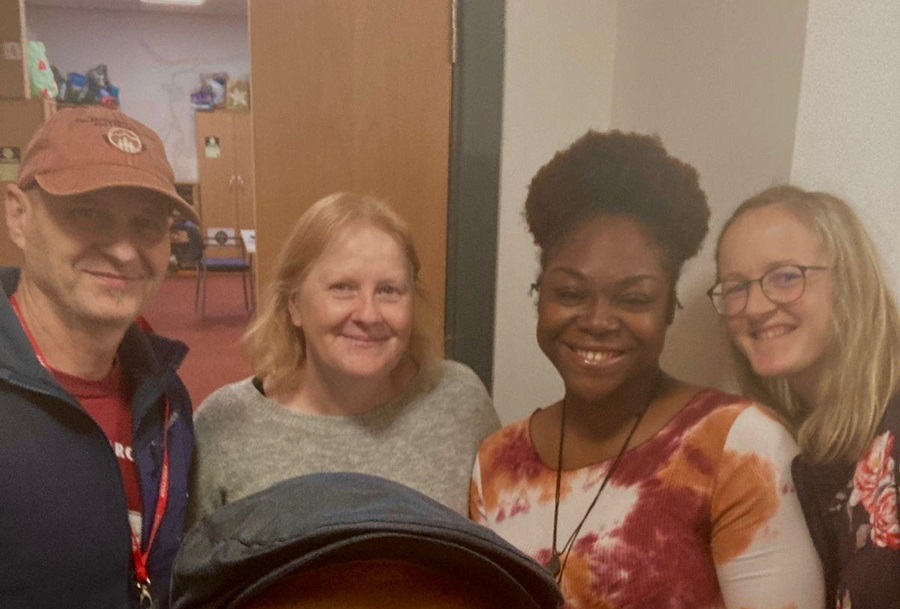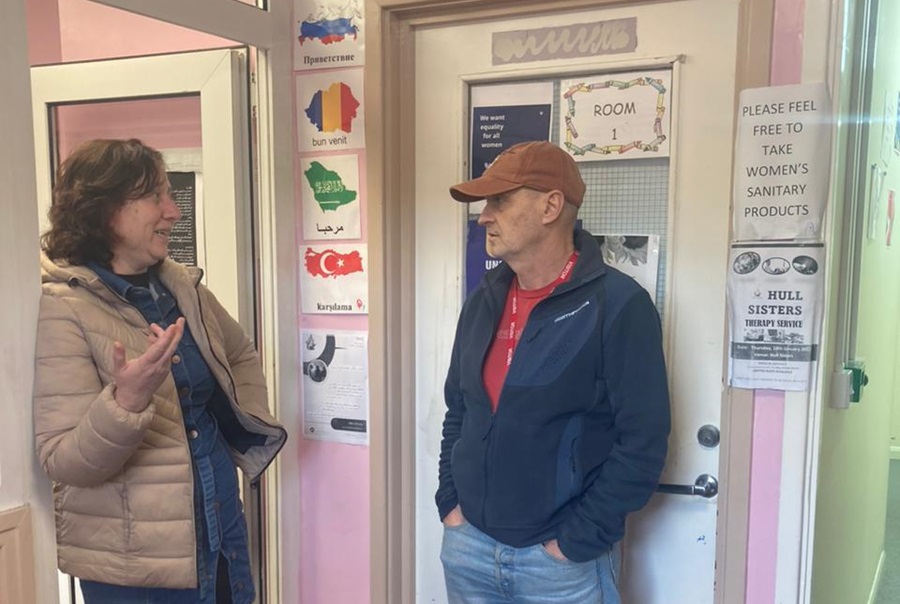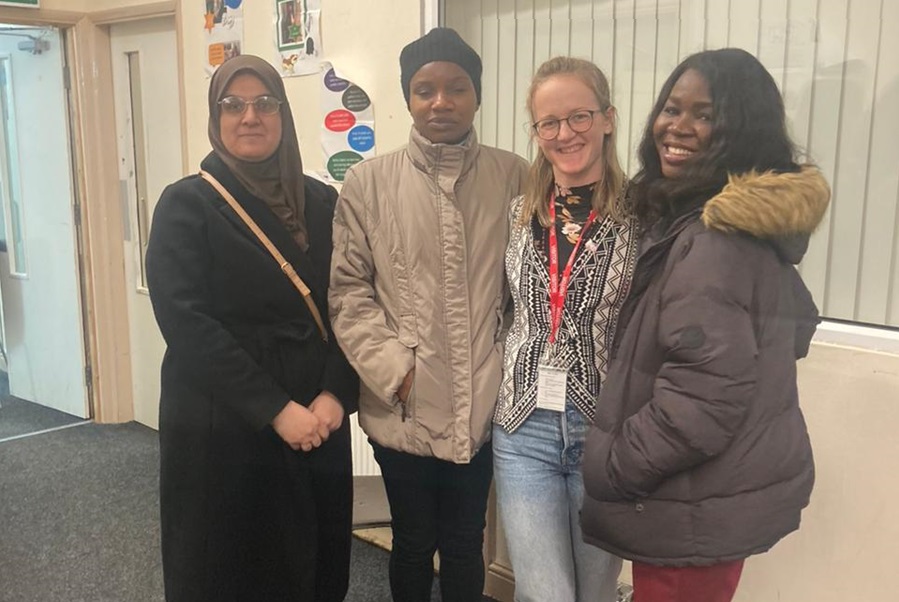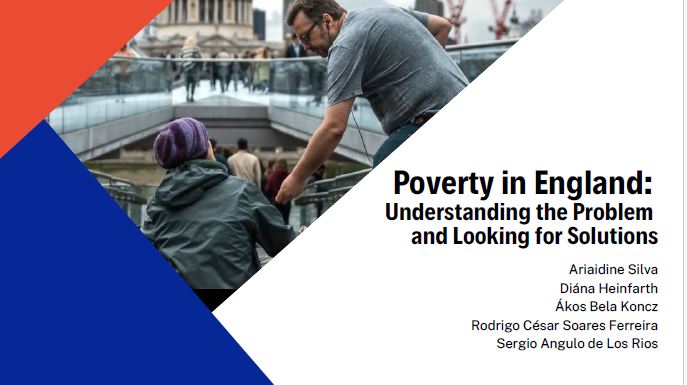Learning from reality - investigation about poverty in England
 Diana and some of the team together with Claire, volunteer at Foster's Pub - one of the hubs for food distribution in Hull
Diana and some of the team together with Claire, volunteer at Foster's Pub - one of the hubs for food distribution in Hull
By Diana Heinfarth, Hungary, Poverty Activist team February 2024
My team and I were given the task of conducting research on real problems in our society. We chose to investigate poverty in England.
In the UK, more than 22 % of the population were living in poverty in 2022/23 – that’s 13.4 million people.
This included:
- 8.1 million (or around 2 in 10) working-age adults
- 4.2 million (or nearly 3 in 10) children
- 2.1 million (or around 1 in 6) pensioners.
During our investigation, we delved into the following topics:
- What is the extent of immigration and homelessness, and how do help these people get help?
- How do food banks and food distributions work?
- Are people trying to help in some other ways as well?
This topic was close to me because I worked with the homeless in my home country for several years and organised food collection and distribution, so I looked at this from a slightly different perspective.
Our investigation took several days and was divided into different parts. During the first 2 days, we did online research, looked for contacts for possible interviews and sent e-mails to various aid organisations. Also, we made phone calls and then we did fieldwork.
Refugees and immigrants - what is the difference?
A big percentage of immigrants and refugees live in poverty in England.
First of all, let's clarify the difference between political refugees or climate refugees, and immigrants. They are all people who move to other countries. The main differences depend on why and under what circumstances they leave their homes and what legal protection this gives them in their new country.
• Refugee
A refugee is a person who is entitled “refugee status” under international refugee law conventions. They are those who left their homeland for political, religious, ethnic or other reasons, because their life, freedom and well-being are in danger if they stay. Refugees must be protected by host countries and have the right to apply for refugee status.
• Migrant / immigrant
A migrant is usually a person who moves to another country, but does not get refugee status. Migrants may travel for economic reasons, family reunification, educational or other personal reasons. They leave their country to seek a better life or opportunities in another country.
We tried to find answers to the following questions online:
• How do refugees arrive in the UK? Why did they decide to come here?
• What are the rules?
• Where are UK's refugees coming from?
• What is the government's position regarding refugees and what policies are they adopting?
During our week-long investigation we researched more than 50 websites, sent many emails, tried to visit 21 places (4 received us) and we talked with 21 people on the streets.
Talking about poverty with people on the streets ....
To learn more about peoples' views on poverty in England, we went to Hull to talk with people. We talked with people walking on the streets and people staying in the queue at food banks. Almost everybody agreed, that the poverty in UK and in Hull increased at the last 15 years.
Different things were mentioned as reasons:
- Lack of education, illiteracy, behavior problems
- Long waiting lists for NHS health care, including mental health
- Increased house rent
- Reduced welfare services because of cut backs in support from the government
- Less work opportunities (jobs increasingly online)
- Discrimination of LGBTQ & women
- Increases in rent
- Soup kitchens shut down because of less money for charity
- Difficult process of any administration, to get vouchers for food banks etc
... and with staff in Hull Food bank
Hull Food Bank answered like this to my questions:
1. Do you agree that there is poverty in England / Hull ?
- Yes
2. What do you think the main reason for poverty?
- Cost of living, cost of gas and electricity plus the social security system is not working and punishes the most vulnerable people.
3. a, Do you think the government supports the poor enough?
- No
4. Do you think the public school gives good education for good paid jobs in the future ?
- No
5. Have you seen any changes during recent years (+/ -) and how do you think the government is trying to improve the situation?
- It's getting worse, year on year - and the food banks are running out of resources.
6. Are there other specific steps to help that you are aware of?
- No, they are making it harder to get help instead.
7. What measures do you think the state should take to reduce poverty?
- If the cost of living were incorporated into the benefits system it would help tremendously. We see a big dip in demand for help, every time one of the payments go out, because then people can take care of their expenses.
8. What kind of social community involvement do you think is important in the fight against poverty?
- Bigger awareness of people’s suffering
9. Which age group do you think is now most affected by poverty ?
- Ages 25-45 plus children. We see a third of our food going to children!
... and with a homeless person, living on the street:
I asked him: Do you receive help from the government? Do you receive training? What is the main problem for you?
He explained to me:
He does receive state aid, but it is not enough for him. He doesn't want training, he needs a job and an apartment instead. Yes, the healthcare system works, but more emphasis should be placed on the prevention of depression. Many people living on the streets are emotionally depressed and need a lot of help. After spending 15 years in prison, nobody gives you a chance… we need patience and greater cooperation.
My conclusion
What I saw during this investigation week is that "rain falls the same on all people" – but here in England, all do not have the same conditions to survive and protect themselves.
You can be poor or rich and you can live far from home, you are still human and maybe we should pay more attention to each other.
The true measure of a society is how it treats the weakest and most vulnerable. Let's make the world a better place by helping the poor, sheltering the homeless and welcoming refugees. Everyone matters and every little action can contribute to a brighter future.








